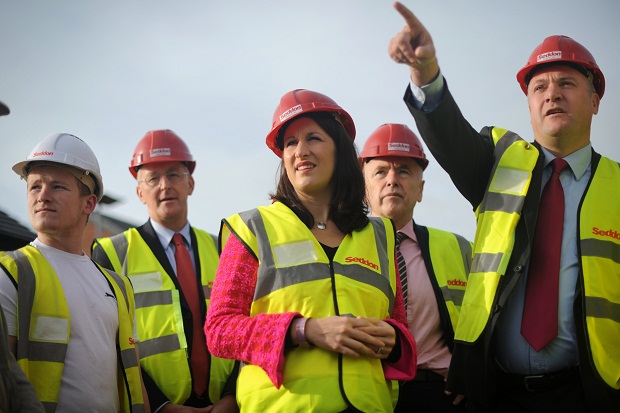Labour’s minimum wage debate in the Commons last night was designed mainly to humiliate the Conservatives about their past opposition to it and to remind voters that only the Labour party cares about those on low wages. But it failed on two counts. The first was that Rachel Reeves fell into the easy trap of accusing someone of missing a vote without double-checking whether this had been for a good reason (all the more surprising given the party’s recent rage over a Sun article describing Lucy Powell as ‘lazy’ when she had in fact been away on maternity leave). She laid into Vince Cable for failing to vote on Labour’s introduction of the minimum wage, saying:
‘I have quoted the former leader of the Liberal Democrats but, back then, where was the Secretary of State for Business, Innovation and Skills, the right hon. Member for Twickenham (Vince Cable)? He was nowhere to be seen in the debates. He was nowhere to be seen on the voting record. On Second Reading and Third Reading, he failed to vote. Apparently, he abstained because he had reservations about a minimum wage. Perhaps he will stand up today to profess his concern for the plight of the low-paid. I am happy to take an intervention from the right hon. Gentleman if he wants to make one.’
When Cable responded to the motion, he explained where he was, and it made uncomfortable listening for the Labour front bench:
‘The hon. Member for Leeds West made a great deal of the fact that, as she put it, the Conservatives opposed the national minimum wage and many Liberal Democrats opposed it. She speaks with all the self-confidence of somebody who was not here at the time.’
Chris Bryant: ‘You were and you didn’t vote.’
Vince Cable: ‘I did not particularly wish to raise this, but I am being asked personally to explain why I did not vote. It had a lot to do with the fact that my late wife was terminally ill at the time and I was in the Royal Marsden hospital. That is why my voting record at the time was poor on that and other issues.’
Later Labour’s Ian Murray accepted that perhaps the party had been unkind to the Business Secretary, and Rachel Reeves has just tweeted that she has written to Cable to apologise. Chris Bryant has also apologised in the past few minutes. It’s not the first time someone has made the mistake of assuming that non-attendance at a vote has a sinister rather than sad explanation, but it rather blunted Labour’s attack on the Lib Dems at least. Unusually, it also meant Vince Cable was left defending the Conservatives, and he did so in an unusually gracious way:
‘As for the Conservatives, although I do not always speak in their defence, I think that they should get credit for accepting that there is a good system that works and for deciding to support it. That is creditable. Although I and my party have supported the national minimum wage, there is a perfectly respectable intellectual and moral argument for not having a minimum wage. Countries that do not have a minimum wage include Sweden, Finland, Norway, Denmark and Austria. Those countries are all in the social democratic tradition, but have felt that it is too problematic. Germany, which has had either social democratic or national unity Governments for most of the post-war period, has adopted a national minimum wage only in the last few weeks. In those countries, where there are civilised values and a sense of solidarity, the costs and benefits of the minimum wage have been debated properly. Why should we criticise people in this country who wanted to have such a debate, but who have now come to a consensus that it is a good system and that we should make it work?’
Reeves’ attack on the Tories had already sounded a little odd, because she had chosen to list the many senior Conservatives, including David Cameron, who opposed and made dire predictions about the minimum wage. This would have made more sense a few weeks ago before the Conservatives started making loud noises about possibly supporting a raise in the minimum wage, and before many Tories on the Right of the party started saying publicly that they had been wrong to oppose Labour’s introduction. The debate itself saw the most loyal Tory MPs such as Charlie Elphicke, who will never step out of line, saying they supported an increase, which gives us as much a clue as anything as to where the Conservatives now stand.
One of the most powerful moments in a Gordon Brown speech was in his 2009 conference address when he listed Labour’s achievements. As part of the list, the Labour PM growled ‘the minimum wage’, and as he did, the conference hall went wild. The Conservatives have now realised the purchase that this policy had on voters’ perceptions of parties, just as they celebrate the purchase that the right-to-buy had when Margaret Thatcher introduced it. Contrition is a rare thing in politics, and yah-booing down the first signs of a party accepting that it made a mistake is hardly the statesmanlike behaviour that Ed Miliband is apparently such a fan of.







Comments